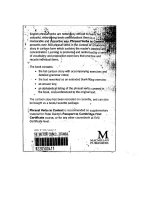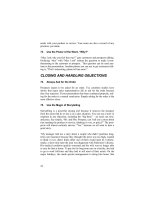101 ways to succeed in selling phần 1 pps
Bạn đang xem bản rút gọn của tài liệu. Xem và tải ngay bản đầy đủ của tài liệu tại đây (302.86 KB, 13 trang )
Thank you for downloading this free PDF version of 101
Ways to Succeed in Selling by Greg Gore.
Please share this PDF file with your friends and col-
leagues.
The following pages are an exact duplicate of the book,
including the cover. This PDF version contains navigat-
ing links and bookmarks. To go to a chapter, click on the
bookmark or use the navigation link by clicking on the
chapter title on the Contents page (PDF page 6).
To order a printed copy of the book, call 1-800-772-9472
(see the inside back cover of the book for a price list—
PDF page 36).
You can print an order form for mailing or faxing by visit-
ing the website,
www.GoreGore.com/101waysorderform.htm
or by visiting the website,
www.booksatgreetingcardprices.com.
Greg Gore’s email address is
Now, enjoy the book!
101 Ways to Succeed in Selling by Greg Gore
© 2001 by Praxis International, Inc., All rights reserved.
101 ways
to
succeed
in
selling
“Everyone lives by selling something.”
—Robert Louis Stevenson
greg gore
3
About the Book
One common denominator of successful people is that they know
how to sell themselves. In this brief, to-the-point book, you’ll learn
101 ways to be successful in selling yourself, a product, service, or
an idea.
The ideas, methods and techniques presented are so easy to apply
you can start using them today. And, they’re so effective you’ll want
to continue to use them for a lifetime.
101 ways to succeed in selling is small enough to keep in your
briefcase or on your desk. Review the ideas often and apply them
at every opportunity. Remember, the ideas will only work when you
apply them.
About the Author
In a sales career spanning more than thirty years and fifteen thou-
sand sales calls, Greg Gore has sold a wide range of products and
services. After being successful selling household products door-
to-door as a college student, he decided to make sales his career.
He went on to sell textbooks, technical seminars, and software pro-
gramming for advanced weapons systems. Along the way, he was
national training director for a direct selling company where he
trained thousands of sales representatives.
Greg Gore has written this book with the hope that others will be
able to benefit from the lessons he learned during his career as a
sales representative, sales manager, and sales trainer. In short, in
101 ways to succeed in selling, Greg Gore gives you the best of
thirty years of sales experience distilled into a small gem of a book.
101 ways
to
succeed
in
selling
greg gore
Praxis International, Inc.
West Chester, Pennsylvania
Copyright © 2001 by
Praxis International, Inc.
1343 Green Hill Avenue
West Chester PA 19380-3959
1-800-772-9472
All rights reserved. No part of this publication may be reproduced or
utilized in any form or by any means, electronic or mechanical, in-
cluding photocopying, recording, or by any information storage or
retrieval system, without permission in writing from the publisher.
Printed in the United States of America
05 04 03 02 01 6 5 4 3 2 1
ISBN 0-9639231-2-9
CONTENTS
Prologue
Part One: Personal Qualities
Character
Attitude
Self-discipline
Part Two: Selling Skills
Planning and Focus
Prospecting
Leveraging Your Referrals
Cold Calling
The Telephone
The Internet
Building Rapport
Presenting
Closing and Handling Objections
After the Sale
Part Three: Life Skills
Epilogue
4
5
5
6
8
11
11
12
12
15
16
17
18
21
24
28
30
32
7
PROLOGUE
Over my thirty year selling career, I have read, re-read and studied
dozens of books on “how to succeed in selling.” While many of
these books admirably cover the what, where, why, and how of sell-
ing, they do not discuss the essence of success in selling.
What do I mean by essence? Consider that a sales repre-
sentative can do and say everything recommended by these au-
thors and yet fail where the authors succeeded. Why? Because the
“essence” of what made these authors sales superstars is not re-
vealed in their books.
Essence is our fundamental nature or who we are as hu-
man beings. This book is based on the premise that personal quali-
ties (our essence) are the foundation for success in sales. Part One
therefore discusses the personal qualities of character, attitude, and
self-discipline. These qualities separate the truly “successful” from
the “also-ran.”
Part Two covers selling skills with emphasis on building
rapport and trust. I have included ways to be vulnerable, because
vulnerability is one of the least documented, yet most important,
pillars of building rapport.
Lastly, Part Three discusses life skills—achieving happi-
ness and fulfillment in life along with success.
Some of the specific ideas presented will be new to you,
some you may have read or heard before and forgotten, and some
you will already be doing. If any of the ideas in 101 ways to suc-
ceed in selling lead you to new heights of accomplishment then the
book will have achieved its purpose.
I hope you will keep me informed of your progress by e-
mailing me at
4
Part One: PERSONAL QUALITIES
CHARACTER
1. Be Honest and Ethical
“I would rather be the man who bought the Brooklyn Bridge than the
man who sold it.”
—Will Rogers
Being honest and ethical is good for your customer, good for your or-
ganization, and perhaps most of all, good for you. Knowing that you are
and have been honest and ethical with those with whom you deal makes
you feel good about yourself. Don’t let the temptation of any short-term
gains by being dishonest or unethical ruin the chance of any long-term
relationship with others.
2. Have Integrity
Having integrity means being whole—that is, being the same person on
the inside as on the outside. Integrity is being truthful to yourself and
others about your values and beliefs. In sales terms, when you have in-
tegrity, you believe in yourself, you believe in your organization, and
you believe in the product or service you are selling. With integrity, your
life is in total alignment with your values. You find that being in sales is
natural and that you have inner motivation because your work is a reflec-
tion of the true “you.” You cannot “fake” integrity. Who you are as a
person always speaks louder than anything you say.
3. Use Competitors to Reach Higher Levels of Success
Competition builds character. Until challenged, we often think we are
doing our best. Our competitors’ efforts give us the impetus to do better.
Through competition we discover reserves we did not know we had.
Even though we may finish a competition behind others, we may well
find that we have produced results that are our personal best.
5
9
ATTITUDE
4. Be Proud of Your Profession
“Every calling is great when greatly pursued.”
—Oliver Wendell Holmes
Being in sales is a career of service. Our whole society is built on the idea
of service. The major religions of the world teach that we are here to serve
others. We can and do make a difference in peoples’ lives.
5. Take Responsibility for Your Own Success
You will be as successful as you decide to be. Tempting as it is to talk
about what others (your organization, your boss, your colleagues) should
be doing or should have done, start viewing goals, problems, and obstacles
from the inside out rather than from the outside in. If you do your best
with honesty and integrity you are already successful. In the end, failure is
self-inflicted and success is self-bestowed.
6. Dehypnotize Yourself
We’ve all witnessed or heard about stage hypnotist acts. Once hypnotized,
the audience volunteer is able to perform remarkable feats such as lifting
great weights or holding arms outstretched for long periods of time at the
suggestion of the hypnotist. What we forget is that the person already had
the capability to perform those feats. So, in a very real sense, a hypnotist
really dehypnotizes us. He or she puts us back in touch with our true self.
Our capabilities are masked by fears or restrictions we or others con-
sciously or subconsciously place on us. Limitations are self-imposed. Do
not accept them. Dehypnotize yourself through a program of positive affir-
mations: “I am successful!” “Today is a great day!” “I am confident,
poised, and relaxed!” “I hold only good thoughts in my mind!”
7. Use Visualization
Visualization is a powerful success tool. Visualization goes beyond the
affirmations of thinking and feeling you are successful to actually “seeing”
yourself being successful. To be truly effective, visualization should en-
6
compass multiple senses—touch, feeling, taste, hearing, and sight.
“Sensing” the result firmly anchors it in our minds. When the result is
firmly anchored in our minds, we have literally created the future.
8. Stay Busy
Just staying productively busy provides a tremendous psychological edge.
You feel better about yourself, your career, and your life.
9. Use Your Product or Service
When you use the product or service you are selling, you personalize its
benefits and you re-ignite your own passion for your product or service.
Moreover, you build customer credibility by being able to cite your own
personal experiences with your product or service.
10. Keep Your Attitude Above Your Knowledge
As we start something new, our attitude is usually above our skill level. As
we progress in the new skill, the natural tendency seems to be that our atti-
tude starts to decline. We must work to maintain a consistently high atti-
tude and we can begin by making a decision—a decision to always keep
our attitude above our skill level.
11. Break-Out of Your Comfort Zone
We can only climb by grabbing the branches, not the flowers. You find out
what you are capable of doing by pushing yourself beyond what you have
done in the past. Train your mind to think, “Here’s how this can be done,”
instead of, “Here’s why that won’t work.”
12. Don’t Take Rejection Personally
If you believe in yourself, your organization, and your product or service,
then you’ll see a prospect’s, “No,” as a loss to the prospect rather than as a
personal rejection. According to the law of averages, each, “No,” puts you
one call closer to another, “Yes.”
7
11
13. Be Thankful for Difficult Times
Sales has ups and downs. Recognize that the downs provide opportunities
for significant growth. Every sales call—regardless of outcome—is a
source of feedback and greater self-knowledge. Accept the downs as a test
of your inner strength and as a challenge to make a victory of your experi-
ence. You have a choice of action and you can make a decision not to be
discouraged and not to quit when you face difficult times. Such a victory
is the best kind of victory—a victory of perseverance and will.
14. Be Patient
“The greatest power is often simple patience.”
—E. Joseph Cossman
The sales process takes time. New sales reps many times push too hard to
close sales now. This can—and usually does—backfire. Often we just
need time in order for things to happen. Understanding that progress can
be slow need not dampen our enthusiasm. Indeed, patience is a virtue. We
must remember that we don’t get the dividend before the investment, or
the harvest before the seed is planted. Just as an investment of one thou-
sand dollars per year compounded at eight percent interest will produce
almost half a million dollars in forty years, an investment of time, money,
and effort plus patience will enable us to be successful. Think of patience
as an equal partner with your other resources. By applying the principle of
compound interest to all of your efforts, you will reap huge dividends.
15. Do Your Best
Not everyone can be number one, but everyone can do his or her best. If
you do your best, then at least one person will be happy!
SELF-DISCIPLINE
16. Build Self-Discipline
“The one quality which sets one apart from another—the key which lifts
one to every aspiration while others are caught in the mire of mediocrity—
8
is not talent, formal education, nor intellectual brightness. It is self-
discipline. With self-discipline, all things are possible. Without it, even the
slightest goal can seem like an impossible dream.”
—Theodore Roosevelt
What is self-discipline? It is making yourself do what you know needs to
be done when it should be done. Self-discipline strengthens your will, as
exercise strengthens your body.
17. Be a Professional
Discipline yourself to set high standards and make all of your acts worthy
of your high standards. Look to the Samurai as a role model of profession-
alism. The Samurai keeps his grooming, clothing, possessions, body and
mind impeccable at all times. The Samurai’s intense physical and mental
training and discipline give him the ability to accept life on a moment-by-
moment basis. Act worthy of yourself!
18. Do What Unsuccessful People Will Not Do
In “The Common Denominator of Success,” the classic booklet written by
Albert E.N. Gray and published over fifty years ago, the common denomi-
nator of success is the discipline to do what unsuccessful people will not
do. Most successful organizations that have a sales training department
will teach the methods the organization has found to work. Yet, sales rep-
resentatives fail because they do not do what they have been instructed to
do. Why? They will not do them because they are hard work or may lead
to rejection, or both. Like cold calling, for example. If you really want to
be successful, discipline yourself to “do what failures will not do.”
19. Work Hard
Sales is a highly paid profession because it does require hard work and
effort. If it were easy, sales would not be so well paid. Recognize that if
you want to be successful in sales or any other profession, you must offer
something in return. In most cases, that something is hard work.
20. Make Hay While the Sun Shines
When you’re hot, you’re hot! On those days when everything just seems to
9
13
go well, don’t stop when you reach your sales quota or your call quota.
Keep going and take advantage of being “in the groove.”
21. Stack the Odds in Your Favor
One of the cardinal rules of investing is “Time, not timing.” Experience
reveals that it is impossible to “time the market.” Most of the annual gains
in the stock market come in only three to five trading days a year and no
one knows when those particular days will occur. Similarly, football,
hockey, basketball, and baseball games are usually won in two or three
plays. What does this say about the role of luck in sales? If you do all of
the right things, you will be in the right place at the right time. When those
two or three plays happen, you want to be there. To be there for those
plays, you have to self-discipline yourself to work day in and day out.
Make the calls, and the sales will take care of themselves.
22. Consider Yourself Lucky If You Have a Support Person
“Our chief want in life is someone who will make us do what we can do.”
—Ralph Waldo Emerson
If you are fortunate enough to have a spouse, family member, or friend
who cares enough about you to make you live up to your potential, you are
fortunate indeed. A sales trainer at a Fortune 500 company begins each
training class with the observation, “having someone who will get you out
of the bed in the morning and off to work is more important to your suc-
cess than any sales technique you will learn.”
10









